John Hartland was one of my great4-grandfathers (there were 31 others). He was born at Newent in Gloucestershire in 1723, the oldest child of Sarah (née Astman) and Thomas Hartland. John had five brothers and two sisters: Thomas, Henry, Miles, Edward, William, Sarah and Nancy. John’s father, who died in 1777, was evidently a devout and serious-minded man, bequeathing to each of his surviving children (Henry and William had predeceased him) a small number of religious and philosophical books. To John he left two volumes of James Hervey’s Meditations and Contemplations (1748), A Christian Directory by Robert Parsons (first published in 1584) and “Judge Hale”, which may have been Mathew Hale’s History and Analysis of the Common Laws of England (1696).
What John Hartland did for the first 36 years of his life is not recorded but it may not have gone down well with his great aunt Anne Hartland who, when she made her will in 1740, did not mention him although she left fifty pounds to each of his siblings. When we do hear of John again is in the pages of the London Evening Post of 3rd May 1759 where it was announced that he was to be an Ensign in the 73rd Regiment of Foot, under its Colonel, Lieutenant-General William Browne. The 73rd were serving in Ireland and had only been in existence for a year having previously been the 2nd Battalion of the 34th Regiment. However, John very soon transferred to the 84th Regiment which was being sent out to India in support of the East India Company, and whether the chance to see India offered a greater appeal we shall never know. John Hartland did not purchase his commission. His father’s will indicates that they were not a wealthy family and therefore unlikely to have been able to afford such an expense, but John could evidently read and write and he was described as a gentleman, so he may have previously volunteered to serve in the ranks as a means to being accepted for promotion as an officer through diligence and experience. It might also explain why John remained a Lieutenant for the remaining 38 years of his service.

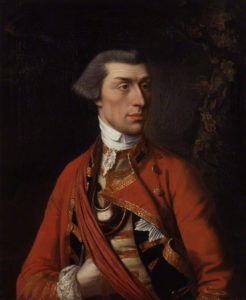
The 84th Regiment were also infantry and had been raised in 1759 by Lieutenant-General Eyre Coote, who would subsequently be appointed Commander-in-Chief of the British army in India. On their arrival in the sub-continent five companies were retained as marines for service on the naval vessels under Vice-Admiral Pocock, which cruised in the Bay of Bengal in support of the land forces. The rest of the regiment were engaged in the Third Carnatic War against the French, part of the wider Seven Years’ War. Their first battle took place at Vandavasi in Tamil Nadu in SE India. Known to the British as Wandiwash, it resulted in the British troops and their Indian allies capturing a large part of the French possessions. The 84th Regiment played a significant part in the decisive action and were later involved in the sieges at Arcot and Pondicherry. Whether John Hartland, who had been promoted to Lieutenant, was in one of the companies at sea or on land is not known, his name not featuring in any of the reports that were published in the English newspapers several months after the events they were describing had taken place.
The success of the British army in India in defeating the French in part resulted in the Treaty of Paris in 1763 which brought the Seven Years’ War and the French control of parts of India to an end. No longer required, the 84th Regiment sailed back to England and was disbanded in 1765, its officers being put on half-pay. John Hartland had been given the option of remaining in India and transferring to the East India Company’s service, but he evidently chose not to. It seems that he left India in the Pigot in March 1764, arriving back in October, ready to begin a new phase in his life at the age of 42. His accumulated pay had been £247 15s 5d, which would have been an initially comfortable cushion against the half-pay he would now be receiving. What John did in the two and a half years after his return is not known but on 6th November 1766, at Fyfield, west of Abingdon in Berkshire, he married Pleasant, the daughter of Thomas and Ann Boycott. Pleasant, who was 20 years younger than her husband, and John went to live in Bensington (now called Benson), about 20 miles away, where Pleasant’s family came from, and raised a family of three girls and a boy: Jemima (my great3-grandmother), Anne (known as Nancy), Sally and John.
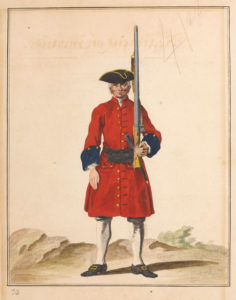
The youngest, John, whose full name was John Christopher Capel Astman Hartland, was only about 18 months old when in February 1775 his father was posted to one of the garrison companies of the 41st Regiment of Foot at Berwick-upon-Tweed in Northumberland. Whether this was by choice or by command is not known, soldiers on half-pay being liable to be called up, but equally John Hartland may have been finding the expense of a young family on half-pay difficult and had been looking for an additional means of income. Nomination for an officer’s appointment was made by the commissioners of the Royal Hospital in Chelsea. John was 52 years old and the £85 a year that full pay offered would make a considerable difference. So the family will have decamped to Berwick; the oldest, Jemima being seven, Nancy five and Sally three. The 41st were officially titled the Royal Invalids and their role was to man garrisons in various locations around the British Isles from the Channel Islands to Fort George, near Inverness, and from Hull to the Isles of Scilly. The regiment was called the Royal Invalids because the soldiers who carried out garrison duties, in places where there was little threat from an enemy, were rather older than those in ‘front-line’ regiments, or had been injured and were no longer fit enough for more active roles. The other ranks were selected from the out-pensioners of the Royal Hospital. In his 1899 History of the Services of the 41st (Welch) Regiment (which the Royal Invalids became), D. Lomax wrote:
Their existence seems to have been a very quiet one, but probably well suited to the deserving class of soldiers of which the regiment was composed. A great many of the men were married, and the officers were generally so aged as to be unfit for the most trivial exertion.
The barracks at Berwick had been built in the early 18th century to a design by Sir Nicholas Hawksmoor. There were three main blocks arranged around a square, with the officers’ quarters at the ends of the long, three-storey, double-range buildings that faced each other across it. There were nine officers of the 41st resident at Berwick, a Captain, Lieutenant and Ensign for each of the three companies, and it may well have been that the Captains and Lieutenants, at least, were married and had families. John Hartland’s family of two adults and four young children might have been difficult to accommodate, the 41st not being the only regiment stationed there, and it is possible that Jemima and Nancy were ‘farmed out’ to relatives, a practice not uncommon at the time.
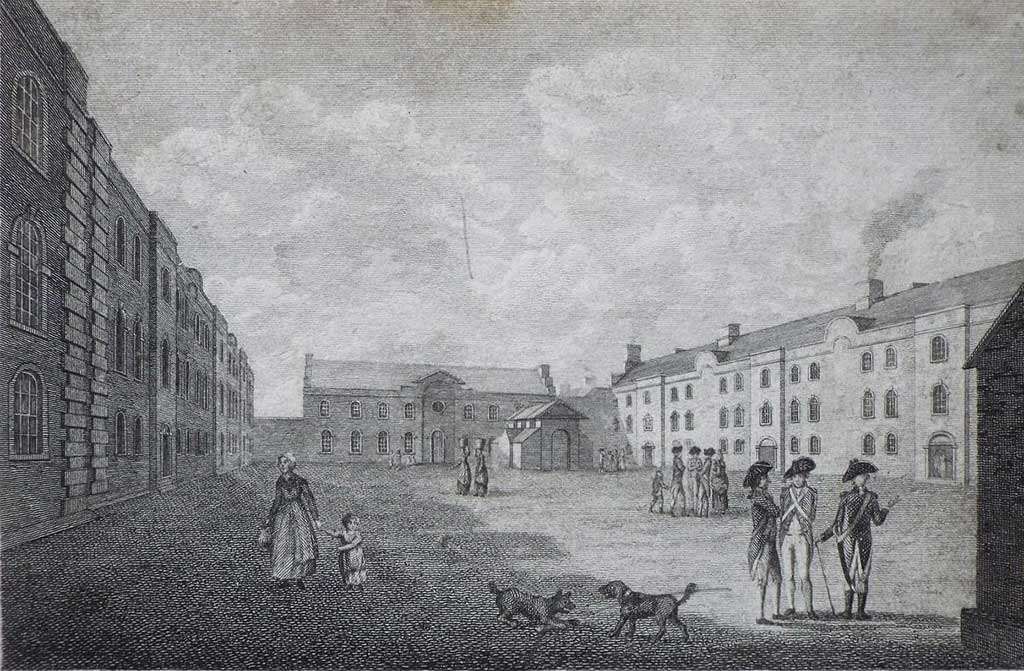
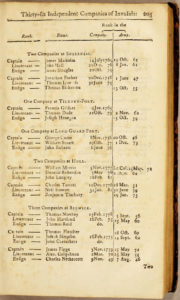
For the next ten years the record is silent save for John’s appearance in the annual Army List. In March 1785 the Whitehall Evening Post announced that he had been appointed Town Adjutant, which increased his annual salary by nearly £70. However, the boost which that would have undoubtedly given to his and Pleasant’s social standing in Berwick would have been tempered by the death, in July of that year, of their youngest daughter at the age of 14. Christened Pleasy Sally Hartland, at her burial her name was recorded as Sarah. The additional post of Adjutant probably meant that John and Pleasant moved out of the barracks into a rented house in the town.

In the next decade all three of John and Pleasant’s surviving children were married: in 1792 Jemima married Joseph Worgan, a curate at Highworth in Wiltshire (see The Worgans); the following year Nancy also married a clergyman, William Mairis, who became vicar of Mudford in Somerset; and in 1795 John, who was a lawyer, married Elizabeth Richards in London. Their details can be seen on the Family Tree.
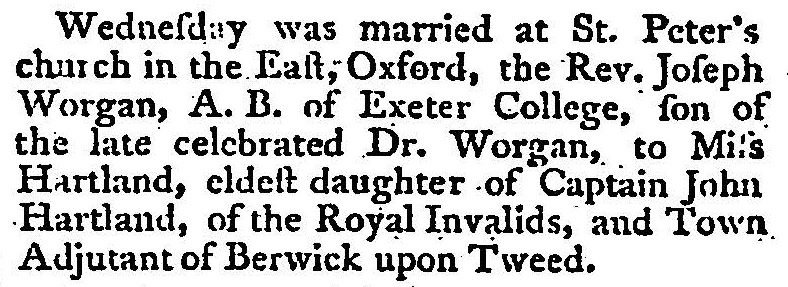
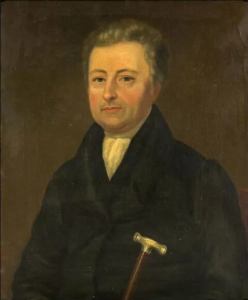
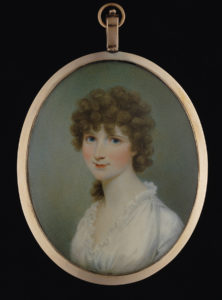
Ten letters written by Pleasant Hartland have survived from this period. She had formed an acquaintance with a Miss Susanna Knight, a lady some 20 years younger than herself, who was a friend of Lord Delaval the owner of Ford Castle, a few miles to the south of Berwick, and also Seaton Delaval Hall near Newcastle. Pleasant used this aristocratic connection to try to further the career of Nancy’s husband, William Mairis, by asking Miss Knight to persuade Lord Delaval to appoint William as his domestic chaplain. She also solicited Miss Knight’s influence to obtain a stewardship for her son John, who was working in London and not enjoying the experience. Although Lord Delaval was apparently willing to recommend John, history does not relate whether the recommendation bore fruit. As to William Mairis, an appointment as Lord Delaval’s chaplain did not materialise, but a few years later he became chaplain to HRH The Duke of Kent, whose daughter Victoria, born in 1819, would become queen.
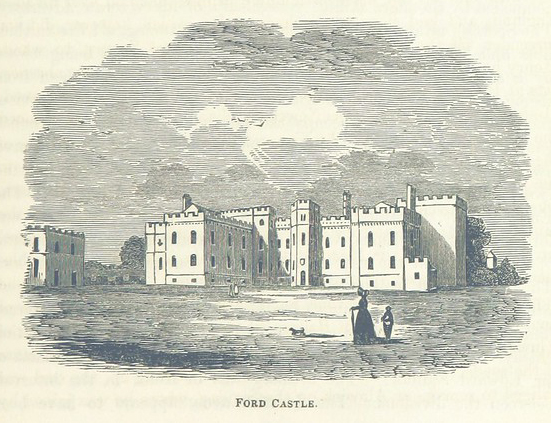
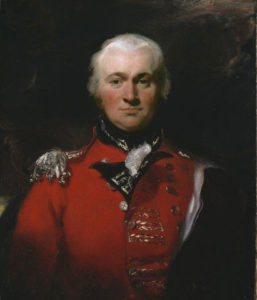
You can read the full text of Pleasant’s letters HERE. They reveal the social distance between the two women; Susanna was a close confidante of Lord Delaval, indeed probably his mistress, but there was an evident friendship between her and Pleasant as gifts were exchanged. Pleasant was always in hope of a visit from Susanna and it is unfortunate that the latter’s replies, which might have given an insight into how much the feelings Pleasant expressed were reciprocated, have not survived. In a letter dated December 1798 Pleasant wrote to Susanna from Bishops Lydiard in Somerset, where she and John were staying with William and Nancy Mairis and their family, bemoaning the fact that John Hartland had been compelled to give up his post at the garrison, and as Town Adjutant, at short notice because of his ill health. She wrote that they had hoped to appeal to the Duke of York, who had been appointed commander-in-chief of the Army that year, but instead had been seen by Colonel Brownrigg, the duke’s military secretary, and their hopes for John’s reinstatement, aged 75, were dashed. He had, nevertheless, been retired on his full Lieutenant’s pay. Pleasant’s final letter to Susanna was to congratulate her on her marriage to 74-year-old Lord Delaval, complimenting her new husband on having “the good sense to discriminate your Ladyships worth, and to set a proper value on it”. That letter, written in January 1803, was addressed from Newent, John Hartland’s birthplace, whence she and John had retired and where, four months later, aged 79, John died.
In his will he left everything to Pleasant for her lifetime, and then to Jemima and Nancy. His son John, who by this time was also living in Newent, had received a settlement in 1794 prior to his marriage. In the event, Pleasant, who was the sole executor, failed to complete the administration of the will and, following her death in 1825 in her son-in-law, Joseph Worgan’s parish of Pebworth in Worcestershire, and leaving no will herself, Jemima took over responsibility and was granted administration. This had to be revoked when she died in 1830 and it was Nancy who brought matters to a conclusion. You can read John Hartland’s will HERE.
